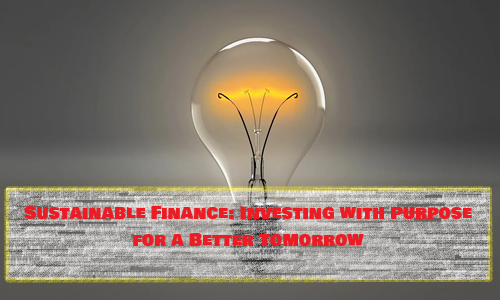Sustainable Finance: Investing with Purpose for a Better Tomorrow
In recent years, the world has witnessed a powerful shift in how investors approach finance. Beyond just seeking profits, a growing number of individuals and institutions are prioritizing sustainability — aiming to generate positive environmental, social, and governance (ESG) outcomes while growing their wealth. This approach, known as sustainable finance, is reshaping markets and redefining what it means to invest wisely.
As global challenges like climate change, social inequality, and corporate governance become front and center, investing with purpose is not only ethically sound but increasingly financially prudent. This blog explores the fundamentals of sustainable finance, why it matters, and practical ways you can align your investment portfolio with your values for a better tomorrow.
What is Sustainable Finance?
Sustainable finance refers to financial activities, including investment, lending, and insurance, that take into account ESG factors alongside traditional financial metrics. It seeks to:
- Support environmentally friendly initiatives: Renewable energy, clean technology, and resource efficiency.
- Promote social responsibility: Fair labor practices, community engagement, and diversity.
- Ensure strong governance: Transparent reporting, ethical management, and accountability.
The goal is to channel capital towards companies and projects that contribute to sustainable development, minimize risks related to ESG issues, and generate long-term value for investors.
Why Sustainable Finance Matters Now
The urgency of global sustainability challenges has galvanized investors:
- Climate Risks: Extreme weather events and regulatory shifts pose financial risks for companies ignoring environmental issues.
- Consumer Expectations: Buyers increasingly prefer brands committed to sustainability, impacting profitability.
- Regulatory Changes: Governments worldwide are introducing stricter ESG reporting and standards.
- Financial Performance: Studies show many sustainable investments match or outperform traditional funds over time.
Sustainable finance aligns profit with purpose, creating opportunities for investors and society.
The Rise of ESG Investing
ESG investing is a popular sustainable finance strategy that evaluates companies based on:
- Environmental criteria: Carbon footprint, energy use, waste management.
- Social criteria: Employee treatment, customer privacy, community relations.
- Governance criteria: Board diversity, executive pay, transparency.
Many asset managers now offer ESG funds or integrate these factors into broader portfolios. ESG investing not only supports responsible businesses but also helps mitigate risks that could harm long-term returns.
Types of Sustainable Investments
Sustainable finance encompasses a broad range of options:
1. Green Bonds
These debt instruments fund projects with environmental benefits, such as renewable energy or clean transportation. Green bonds offer fixed returns while financing sustainability.
2. Impact Investing
This approach targets measurable social or environmental impact alongside financial gains. Investors often support ventures addressing poverty, education, or health.
3. Socially Responsible Investing (SRI)
SRI involves screening companies to exclude those involved in harmful industries like tobacco, fossil fuels, or weapons. It reflects ethical preferences.
4. Sustainable ETFs and Mutual Funds
Funds focused on ESG criteria allow investors to diversify while supporting sustainability themes.
How to Start Investing Sustainably
- Define Your Values and Goals
Consider which ESG issues matter most to you — climate action, social justice, or corporate ethics. Your investment choices should align with these priorities.
- Research Investment Options
Look for funds or companies with transparent ESG policies and positive track records. Resources like MSCI ESG ratings or Sustainalytics provide valuable insights.
- Diversify Your Portfolio
Incorporate a mix of sustainable assets across sectors and geographies to balance risk and return.
- Consult Financial Advisors
Work with advisors knowledgeable in sustainable finance to tailor strategies for your goals and risk tolerance.
- Monitor Impact and Performance
Track both financial returns and ESG outcomes regularly. Sustainable investing is a journey requiring ongoing commitment.
Challenges and Criticisms
While sustainable finance is growing, it faces hurdles:
- Greenwashing: Some firms exaggerate ESG credentials without meaningful action.
- Data Gaps: ESG metrics can be inconsistent or incomplete.
- Performance Concerns: Some investors worry sustainable funds may sacrifice returns.
- Complexity: Navigating diverse standards and definitions can be confusing.
Investors must remain vigilant, seek transparency, and focus on credible, impact-driven investments.
The Future of Sustainable Finance
The momentum behind sustainable finance shows no signs of slowing. Innovations such as:
- Climate risk modeling: Enhancing investment decisions with better environmental data.
- Regulatory frameworks: Governments worldwide advancing mandatory ESG disclosures.
- Technological advances: Blockchain for transparent impact tracking.
- Investor activism: Shareholders pushing companies toward sustainability.
Together, these trends promise a more resilient and responsible financial ecosystem that benefits both people and planet.
Real-World Impact: Stories of Change
Consider Patagonia, the outdoor apparel company known for its commitment to environmental activism. By investing in sustainable materials, supporting conservation efforts, and advocating for climate policy, Patagonia has built a loyal customer base and strong financial performance.
Similarly, large pension funds worldwide are divesting from fossil fuels and increasing allocations to renewable energy projects, signaling a profound shift in capital flows toward sustainability.
Conclusion: Invest with Purpose for a Better Tomorrow
Sustainable finance represents a powerful opportunity to grow your wealth while making a tangible difference in the world. By integrating ESG principles into your investment strategy, you not only protect your portfolio from emerging risks but also contribute to building a healthier, fairer, and more sustainable future.
The path to investing with purpose begins with awareness, education, and intentional choices. Whether you’re a seasoned investor or just starting, sustainable finance offers tools and opportunities to align your money with your values — turning financial goals into positive global impact.



